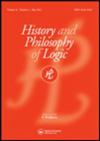Intuitionist and Classical Dimensions of Hegel’s Hybrid Logic
IF 0.5
3区 哲学
Q3 HISTORY & PHILOSOPHY OF SCIENCE
引用次数: 0
Abstract
Hegel interpreters commonly reject attempts to situate Hegel’s logic in relation to modern movements. Appealing to his criticisms of the logic of Verstand or mere understanding with its fixed logical structure, Hegel’s logic, it is pointed out, was a logic of Vernunft or reason—a logic more at home in the thought of Plato and Aristotle than in modern mathematical forms. Contesting this implied dichotomy, it is here argued that the ancient roots of Hegel’s logic, especially as transmitted by late Neopythagorean/Neoplatonic thinkers such as Proclus, gave it many features similar to ones later found in the type of algebraic transformation of Aristotle, started first by Leibniz, reanimated by Boole in the mid-nineteenth century and then developed by others such as C. S. Peirce and Arend Heyting. In particular, the ancient mathematics upon which Hegel had drawn allowed him to anticipate an answer to the criticism that Frege would later aim at Boole, concerning his inability to unite opposed class and propositional calculi. Hegel’s logic would be a hybrid, incorporating features found later in intuitionist and classical logic, but it could be so because of the way he had called upon the mathematics of the ancient Platonist tradition.黑格尔混合逻辑的直觉与古典维度
黑格尔诠释者通常拒绝将黑格尔逻辑与现代运动联系起来。有人指出,黑格尔的逻辑是一种理性的逻辑,是柏拉图和亚里士多德思想中的逻辑,而不是现代数学形式中的逻辑。对这种隐含的二分法提出异议,这里认为黑格尔逻辑的古代根源,特别是由普罗克劳斯等新毕达哥拉斯/新柏拉图主义思想家传播的,赋予了它许多类似于后来在亚里士多德的代数变换类型中发现的特征,这些特征首先由莱布尼茨开始,在19世纪中叶由布尔重新活跃起来,然后由C. S.皮尔斯和阿伦特·海廷等人发展。特别是,黑格尔所借鉴的古代数学,使他能够预见到弗雷格后来针对布尔的批评,即他无法统一对立的阶级和命题微积分。黑格尔的逻辑将是一种混合体,融合了后来在直觉主义和古典逻辑中发现的特征,但这可能是由于他调用了古代柏拉图主义传统的数学方法。
本文章由计算机程序翻译,如有差异,请以英文原文为准。
求助全文
约1分钟内获得全文
求助全文
来源期刊

History and Philosophy of Logic
综合性期刊-科学史与科学哲学
CiteScore
0.80
自引率
0.00%
发文量
24
审稿时长
>12 weeks
期刊介绍:
History and Philosophy of Logic contains articles, notes and book reviews dealing with the history and philosophy of logic. ’Logic’ is understood to be any volume of knowledge which was regarded as logic at the time in question. ’History’ refers back to ancient times and also to work in this century; however, the Editor will not accept articles, including review articles, on very recent work on a topic. ’Philosophy’ refers to broad and general questions: specialist articles which are now classed as ’philosophical logic’ will not be published.
The Editor will consider articles on the relationship between logic and other branches of knowledge, but the component of logic must be substantial. Topics with no temporal specification are to be interpreted both historically and philosophically. Each topic includes its own metalogic where appropriate.
 求助内容:
求助内容: 应助结果提醒方式:
应助结果提醒方式:


